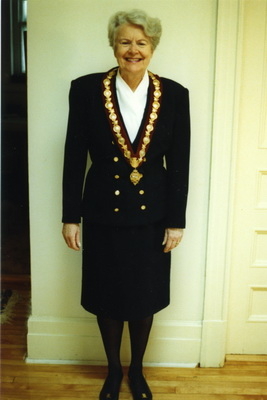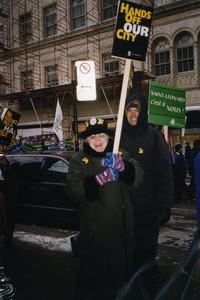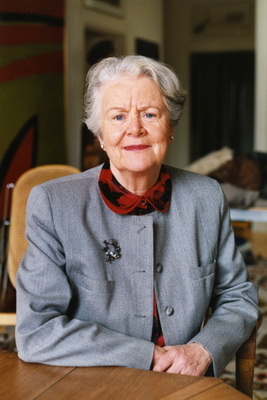Not only was May Cutler the fearless Quebec champion of kids lit who pioneered the market for quality children’s books in Canada through her publishing house Tundra Books she was also the girl from the other side of the tracks, the outsider, who in 1987 became the hell-raising Mayor of Westmount, the first woman elected to run the tony Montreal suburb.
 Cutler, who was 87 when she died on March 3, was a rock: solid and uncompromising. Her name was often mentioned in the same breath as Vera Danyluck, the Mayor of the Town of Mount Royal, who died in November. But there are no comparisons; if Danlyluck was a Iron fist in a velvet glove, May was an steel fist in a boxer’s glove. She was frank, headstrong and outspoken. Her saving grace was her discriminating good taste, her curious mind, her wicked sense of Irish humour and her self-deprecating charm which allowed her to convert her enemies into friends. She had a twinkle in her eye, and even if you din’t agree with her, she seemed to be having so much fun you wanted to be complicit in whatever mischief she was up to. “She bucked the establishment, she took on the old guard, she had no hidden agenda. Her mind was forever working on THE next project” said former Westmount Mayor Karin Marks, “Her latest idea was to have Montreal become an international centre for women against violence. Once you met May, you always remembered her.”
Cutler, who was 87 when she died on March 3, was a rock: solid and uncompromising. Her name was often mentioned in the same breath as Vera Danyluck, the Mayor of the Town of Mount Royal, who died in November. But there are no comparisons; if Danlyluck was a Iron fist in a velvet glove, May was an steel fist in a boxer’s glove. She was frank, headstrong and outspoken. Her saving grace was her discriminating good taste, her curious mind, her wicked sense of Irish humour and her self-deprecating charm which allowed her to convert her enemies into friends. She had a twinkle in her eye, and even if you din’t agree with her, she seemed to be having so much fun you wanted to be complicit in whatever mischief she was up to. “She bucked the establishment, she took on the old guard, she had no hidden agenda. Her mind was forever working on THE next project” said former Westmount Mayor Karin Marks, “Her latest idea was to have Montreal become an international centre for women against violence. Once you met May, you always remembered her.”
May Ebbitt was born Sept 4, 1923. Her father was a Irish protestant, a beat cop, and she grew up in a tough French-Catholic east-end Montreal neighbourhood. She received her arts degree from McGill University in 1945, then headed to Columbia University for a degree in journalism. It was while working as a receptionist at the United Nations in New York that she learned to appreciate the aggressive entrepeneurship that she experienced in the United States. By comparison, she said, Canadians were cowards and syncophants. “Americans are horse traders,” she said, “and we’ve got to become horse traders too.” When she returned to Montreal she wrote for the defunct Montreal Herald and The Standard while taking her M.A. in English literature. In 1952 she married labour lawyer Phillip Culter, who was later appointed to the bench. They had four boys. Determined to produce quality literature for children, she founded her own publishing house, Tundra books in 1967 and self-published her own book, The Last Noble Savage. She also turned out such classics as Roch Carrier’s The Hockey Sweater and Willilam Kureluk’s A Prairie Boys Winter. Culter had a good head for business and a keen marketing sense. At Hallowe’en she would hand out her books to children who showed up at her door instead of candy. Not all of the children appreciated the gesture. “She was independent, she was aggressive, she could wear people down,” her son Keir admits, “But she also turned a lot of her enemies into friends. She was so into charity, helping other people and giving back. When she started Tundra Books, she hated the Canadian inferiority complex, the attitude that we weren’t as good as the Americans. In the end, the world came to her. By the time Cutler sold her publishing house to McClelland & Stewart in 1987, it had a solid international reputation.
 Cutler’s decided to run for mayor out of spite after the City of Westmount refused to let her to move her publishing house into a building that had been zoned for 17 professionals including dentists, engineers and chiropractors. The city’s position was that if publishers were allowed, pornographers were sure to follow. Instead of getting angry Culter decided to get even. The city, she claimed, was treating its residents “like high strung neurotics and needed a shake-up. “ Historically Westmount had been run as a private club. Its mayor’s were really anointed, elected by acclaimation from within its own ranks. Cutler defeated Brian Gallery, who was then acting Chairman of Canadian National Railways. Gallery thought he was a shoo-in and had recently undergone surgery. Trailing late in the race, he was forced to campaign on crutches. Image was everything. Cutler won. On her first day in office she refused to sit in the mayor’s chair, claiming it was too ostentatious. “Cutler briskly began (her term) by shaking up council. She sparked with the pyrotechnical brilliance of a high voltage wire,” Sherrill Maclaren wrote in, Invisible Power: The Women who run Canada. After Quebec premier René Lévesque died, Cutler adamantly refused to have the section of Montreal’s Dorchester Blvd that runs through Westmount renamed in his honour “I despise nationalism – Quebec nationalism, Canadian nationalism, Toronto nationalism. It’s all the same. Jingoism!,” she told the Globe & Mail in an interview. Her lasting legacy as mayor was to spark the restoration of Westmount`s library, a handsome Victorian building that opened in 1899. During her term however, she alienated the entire city council with her brash, uncompromising style. “In her desire to clean up city hall, to brush it clean, instead of using a broom, she used a torch,” complained one councilor, Rhoda Vineberg. When council demanded she resign, Cutler went on strike. In a forthcoming book about Quebec Municipal politics, Westmount Mayor Peter Trent writes Culter “had a chip on her shoulder that could make a Sumo wrestler tremble.” Cutler called a public meeting to resolve the issue where she appealed directly to the city’s residents for their c ontinued support. They gave it to her. Having scored her point, she stepped down as mayor after one term and hand-picked Peter Trent as her successor.
Cutler’s decided to run for mayor out of spite after the City of Westmount refused to let her to move her publishing house into a building that had been zoned for 17 professionals including dentists, engineers and chiropractors. The city’s position was that if publishers were allowed, pornographers were sure to follow. Instead of getting angry Culter decided to get even. The city, she claimed, was treating its residents “like high strung neurotics and needed a shake-up. “ Historically Westmount had been run as a private club. Its mayor’s were really anointed, elected by acclaimation from within its own ranks. Cutler defeated Brian Gallery, who was then acting Chairman of Canadian National Railways. Gallery thought he was a shoo-in and had recently undergone surgery. Trailing late in the race, he was forced to campaign on crutches. Image was everything. Cutler won. On her first day in office she refused to sit in the mayor’s chair, claiming it was too ostentatious. “Cutler briskly began (her term) by shaking up council. She sparked with the pyrotechnical brilliance of a high voltage wire,” Sherrill Maclaren wrote in, Invisible Power: The Women who run Canada. After Quebec premier René Lévesque died, Cutler adamantly refused to have the section of Montreal’s Dorchester Blvd that runs through Westmount renamed in his honour “I despise nationalism – Quebec nationalism, Canadian nationalism, Toronto nationalism. It’s all the same. Jingoism!,” she told the Globe & Mail in an interview. Her lasting legacy as mayor was to spark the restoration of Westmount`s library, a handsome Victorian building that opened in 1899. During her term however, she alienated the entire city council with her brash, uncompromising style. “In her desire to clean up city hall, to brush it clean, instead of using a broom, she used a torch,” complained one councilor, Rhoda Vineberg. When council demanded she resign, Cutler went on strike. In a forthcoming book about Quebec Municipal politics, Westmount Mayor Peter Trent writes Culter “had a chip on her shoulder that could make a Sumo wrestler tremble.” Cutler called a public meeting to resolve the issue where she appealed directly to the city’s residents for their c ontinued support. They gave it to her. Having scored her point, she stepped down as mayor after one term and hand-picked Peter Trent as her successor.
 Her reaction to growing old was to lead public protest demonstrations against forced municipal mergers on the Island of Montreal and to write a couple of plays, Aah-pootee! That’s Snow and The Man Who Killed the Man who Killed Jimmy Hoffa. When she was 86 she travelled to Antarctica, and as she was dying she completed a biography of Quebec painter Paul-Emile Borduas. She was also an inveterate writer of letters –to the-editor. Typical was one she sent to Gazette publisher Michael Goldbloom after the English language daily ignored a story that she and most of its readers considered important. “Who decides what play is given to your news stories. Has that person dropped in from Mars and knows nothing of what happens here,” she thundered. “Am I telling you how to run your newspaper? You damn well right I am.”
Her reaction to growing old was to lead public protest demonstrations against forced municipal mergers on the Island of Montreal and to write a couple of plays, Aah-pootee! That’s Snow and The Man Who Killed the Man who Killed Jimmy Hoffa. When she was 86 she travelled to Antarctica, and as she was dying she completed a biography of Quebec painter Paul-Emile Borduas. She was also an inveterate writer of letters –to the-editor. Typical was one she sent to Gazette publisher Michael Goldbloom after the English language daily ignored a story that she and most of its readers considered important. “Who decides what play is given to your news stories. Has that person dropped in from Mars and knows nothing of what happens here,” she thundered. “Am I telling you how to run your newspaper? You damn well right I am.”
Her husband died in 1987. She leaves her children, Keir, an actor, her twins, Adam and Michael, and Roger. A memorial service will be held at Victoria Hall in Westmount 2 p.m. March 19

























Comments
Please login to post comments.